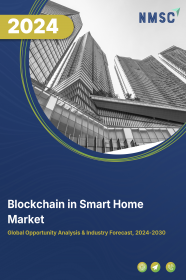
Blockchain in Smart Home Market by Component (Hardware, Software, and Services), by Application (Home Automation, Energy Management, Smart Appliances, Security & Surveillance, and Others), and by End-User (Residential, Commercial, and Industrial)- Global Opportunity Analysis and Industry Forecast 2024-2030
US Tariff Impact on Blockchain in Smart Home Market
Trump Tariffs Are Reshaping Global Business
Blockchain in Smart Home Market Overview
The Blockchain in Smart Home Market size was valued at USD 520.0 million in 2023 and is predicted to reach USD 5815.3 million by 2030 with a CAGR of 41.2% from 2024-2030.
Blockchain in smart homes refers to the integration of blockchain technology into home automation systems to enhance security, efficiency, and interoperability. In smart homes, blockchain can be utilized to securely manage and authenticate devices, data, and transactions within the home ecosystem. By leveraging blockchain's decentralized and immutable ledger, smart home devices can communicate and interact with each other securely without the need for intermediaries.
This ensures that sensitive information such as user preferences, device statuses, and access controls remain tamper-proof and transparent. Additionally, blockchain can facilitate secure peer-to-peer transactions between devices, enabling autonomous and trustless exchanges of energy, resources, or services within the smart home environment. Overall, blockchain technology enhances the reliability, privacy, and resilience of smart home systems, paving the way for more secure and intelligent living spaces.
Market Dynamics and Trends
The growing need for secure and decentralized systems to safeguard personal information and data from unauthorized access is fueling the expansion of the blockchain in the smart home market. For instance, Bitdefender, a leading company in smart home security, published a security risk report in 2022, highlighting the significant growth of smart home devices globally and the corresponding increase in cyberattacks. According to the report, home networks and smart devices experience an average of 8 attacks every 24 hours.
This underscores the growing importance of robust security measures, such as blockchain technology, to protect smart home environments from cyber threats and unauthorized access. By integrating blockchain technology into smart homes, users can benefit from enhanced security measures to protect against breaches and unauthorized access to sensitive data. The use of blockchain ensures that personal information and data remain secure and immutable, mitigating the risks of hacking and unauthorized intrusion.
Moreover, the integration of blockchain technology with IoT devices in smart homes is further propelling the growth of the market. By combining blockchain with IoT devices, smart home systems are enhancing security, privacy, and interoperability, ensuring secure communication and data exchange among connected devices, reducing vulnerabilities to cyber threats and unauthorized access.
Furthermore, governments around the world are investing in blockchain technology to provide secure and decentralized systems, particularly in the areas of smart cities and smart homes are driving the growth of the blockchain in the smart homes market.
For instance, in January 2023, the Indian government launched a blockchain module in collaboration with crypto-focused 5ire and Network Capital, a mentorship and career exploration platform. By investing in blockchain solutions and promoting partnerships with industry players, governments across the glove are contributing to the growth of the blockchain in the various industries, including smart homes.
However, high cost of blockchain technology is the major factor restraining the growth of the blockchain in the smart homes market. On the contrary, the introduction of 5G technology and Web 4.0 that will bring high speeds, low latency, and communication between devices is expected to create ample opportunities in the coming years. 5G network’s lightning-fast data transmission along with web 4.0’s autonomous systems are poised to revolutionize industries, including smart homes shaping the future of connectivity and communication.
Market Segmentations and Scope of the Study
The blockchain in smart home market report is segmented on the basis of component, application, end user, and region. On the basis of component, the market is divided into hardware, software, and services. On the basis of application, the market is classified into home automation, energy management, smart appliances, security & surveillance, and others. On the basis of end user, the market is segmented into residential, commercial, and industrial. Regional breakdown and analysis of each of the aforesaid segments include regions comprising of North America, Europe, Asia-Pacific, and RoW.
Geographical Analysis
North America holds the dominant share of blockchain in the smart home market and is expected to continue its dominance during the forecast period. This is attributed to factors such as the growing adoption of smart homes and connected devices that need internet and Wi-Fi connectivity is significantly boosting in countries such as the U.S. and Canada.
For instance, the average house in the U.S. has 20 connected devices including smartphones, computers, tablets, smart TVs, smart speakers, connected lighting systems, and connected appliances. With such rise in the number of smart home devices in the region, the demand for blockchain based smart home devices are poised to rise. Moreover, presence of key market players such as Comcast Corporation, Kingspin Technology Services, and Xage Security Inc. are anticipated to further drive the growth of the market in this region.
For instance, in November 2023, Comcast's Xfinity introduced two new security devices; the Xfinity Door and Window Sensor, and the Xfinity Motion Sensor designed for home monitoring. The devices offer Wi-Fi connectivity and can seamlessly integrate into Xfinity's broad array of home monitoring devices, such as Indoor and Outdoor Cameras, Video Doorbell, and Smart Thermostat.
On the other hand, Asia Pacific is expected to show a steady rise in the growth of the blockchain in the smart homes market due to the growing focus on digitalization in countries such as China, India, and Japan. According to the State Council Information Office of China, the country's digitalization is among the most rapidly advancing globally, with its digital economy reaching USD 6.99 trillion in 2022. By June 2023, China boasted approximately 1.08 billion internet users, with penetration rising to 76.4 percent. These developments underscore the region's growing focus on digital transformation, which in turn is expected to fuel the adoption of blockchain technology in smart homes.
Moreover, the growing penetration of smartphones, smart devices, and the internet in the Asia Pacific region is expected to drive the growth of the blockchain in smart homes market. According to the latest report published by the Global System for Mobile Communications (GSMA), smartphone ownership in this region reached over 76 percent in 2022 and is projected to increase to 94 percent by 2030. Additionally, the adoption of 5G connections is anticipated to rise significantly from 4 percent in 2022 to 41 percent by 2030. With such rise in the smart devices, the blockchain for smart homes market is anticipated to expand in this region.
Competitive Landscape
Various market players operating in the blockchain in the smart home market include OSIZ Technologies Private Ltd, Telstra Group Limited, Comcast Corporation, Blockchain App Factory, Kingspin Technology Services, Samsung Electronics, TokyoTechie, Mobiloitte Technologies India Pvt. Ltd., Tata Consultancy Services Limited, Xage Security Inc., and others. These market players are adopting product launches to remain dominant in the blockchain in smart homes market.
For instance, in November 2021, Kingspin Technology Services launched its blockchain services for consumers in India. The firm also planned to focus on other digital transformation technologies such as data science and IoT. Moreover, in October 2022, Samsung Electronics launched the blockchain-based security solution Knox Matrix for smart home devices. Through this launch, the company provided users their own private blockchain system to strengthen security through multi-layered mutual monitoring across connected devices such as smartphones and smart home devices.
Key Benefits
-
The report provides quantitative analysis and estimations of blockchain in smart home market from 2024 to 2030, which assists in identifying the prevailing market opportunities.
-
The study comprises a deep dive analysis of the blockchain in smart home market including the current and future trends to depict prevalent investment pockets in the market.
-
Information related to key drivers, restraints, and opportunities and their impact on the blockchain in smart home market is provided in the report.
-
Competitive analysis of the players, along with their market share is provided in the report.
-
SWOT analysis and Porters Five Forces model is elaborated in the study.
-
Value chain analysis in the market study provides a clear picture of roles of stakeholders.
Blockchain in Smart Home Market Key Segments
By Component
-
Hardware
-
Software
-
Services
By Application
-
Home Automation
-
Energy Management
-
Smart Appliances
-
Security & Surveillance
-
Others
By End-User
-
Residential
-
Commercial
-
Industrial
By Region
-
North America
-
The U.S.
-
Canada
-
Mexico
-
-
Europe
-
The UK
-
Germany
-
France
-
Italy
-
Spain
-
Denmark
-
Netherlands
-
Finland
-
Sweden
-
Norway
-
Russia
-
Rest of Europe
-
-
Asia Pacific
-
China
-
Japan
-
India
-
South Korea
-
Australia
-
Indonesia
-
Singapore
-
Taiwan
-
Thailand
-
Rest of Asia Pacific
-
-
RoW
-
Latin America
-
Middle East
-
Africa
-
REPORT SCOPE AND SEGMENTATION:
|
Parameters |
Details |
|
Market Size in 2023 |
USD 520.0 Million |
|
Revenue Forecast in 2030 |
USD 5815.3 Million |
|
Growth Rate |
CAGR of 41.2% from 2024 to 2030 |
|
Analysis Period |
2023–2030 |
|
Base Year Considered |
2023 |
|
Forecast Period |
2024–2030 |
|
Market Size Estimation |
Million (USD) |
|
Growth Factors |
|
|
Countries Covered |
28 |
|
Companies Profiled |
10 |
|
Market Share |
Available for 10 companies |
|
Customization Scope |
Free customization (equivalent up to 80 working hours of analysts) after purchase. Addition or alteration to country, regional, and segment scope. |
|
Pricing and Purchase Options |
Avail customized purchase options to meet your exact research needs. |
Key Players
-
OSIZ Technologies Private Ltd.
-
Telstra Group Limited
-
Comcast Corporation
-
Blockchain App Factory
-
Kingspin Technology Services
-
Samsung Electronics
-
TokyoTechie
-
Mobiloitte Technologies India Pvt. Ltd.
-
Tata Consultancy Services Limited
-
Xage Security Inc.

















 Speak to Our Analyst
Speak to Our Analyst




















